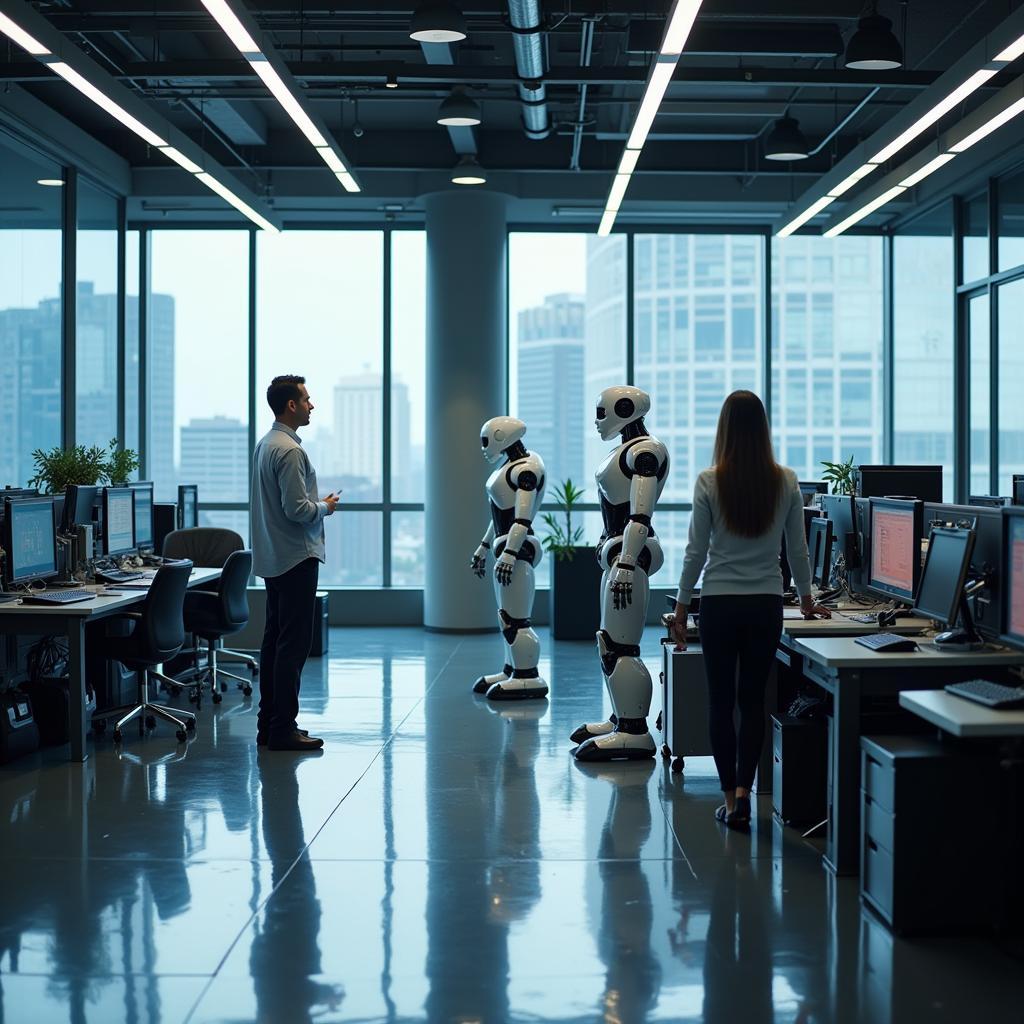The effects of automation on job markets has become an increasingly common topic in IELTS Writing Task 2, appearing in various forms across test centers globally. Based on analysis of past exam questions and the effects of automation on job markets, this theme is likely to remain relevant in future tests. Let’s examine a recent example and explore sample responses across different band scores.

Task Analysis
Some people believe that the increasing use of automation and artificial intelligence in the workplace will lead to widespread unemployment. Others argue that these technologies will create new job opportunities. Discuss both views and give your opinion.
This question requires candidates to:
- Examine both perspectives on automation’s impact on employment
- Provide relevant examples and evidence
- Present a clear personal stance
- Develop a well-structured argument
Band 8.5 Sample Essay
The rapid advancement of automation and artificial intelligence has sparked intense debate about its implications for global employment. While some fear widespread job losses, others anticipate new opportunities emerging from this technological revolution. In my view, while certain jobs will undoubtedly disappear, the overall impact will be transformative rather than destructive.
Those concerned about unemployment make valid points about how automation is affecting global employment. Manufacturing, transportation, and customer service sectors are already experiencing significant workforce reductions as machines replace human workers. For instance, automated assembly lines have drastically reduced the need for factory workers, while self-checkout systems are diminishing retail employment opportunities.
However, proponents of technological advancement argue convincingly that automation creates new job categories and opportunities. The development, maintenance, and oversight of automated systems require skilled professionals, leading to increased demand for software developers, robotics engineers, and AI specialists. Furthermore, automation often enhances productivity, enabling companies to expand operations and create positions in areas requiring human creativity, emotional intelligence, and complex problem-solving skills.
In my assessment, while impact of automation on low-income workers will be significant, the key lies in adaptation and preparation. Society must focus on retraining programs, education reform, and policies that support workforce transition. The historical pattern of technological revolutions suggests that initial disruption eventually gives way to new equilibrium with different, often more sophisticated employment opportunities.
Band 6.5 Sample Essay
Nowadays, many people worry about losing their jobs because of automation and AI, but others think these technologies will make new jobs. I think both sides have good points, but new jobs will probably be created.
Some people think automation is bad for jobs. In factories, robots are doing work that people used to do. For example, car factories now use machines instead of workers. Also, in shops, self-service machines are replacing cashiers. This makes many people lose their jobs and they worry about their future.
But other people say automation makes new jobs. When companies use new machines, they need people who can fix and control them. This means more jobs for computer experts and engineers. Also, when companies save money with machines, they can make their business bigger and hire more people for different jobs.
I believe why AI should be regulated to protect jobs is important, but we should also prepare for change. People need to learn new skills to work with machines. The government should help workers learn these new skills. Even though some old jobs will disappear, new and better jobs will come.
Key Vocabulary
- Automation (n) /ˌɔːtəˈmeɪʃn/ – the use of machines and computers to do work that was previously done by humans
- Artificial Intelligence (n) /ˌɑːtɪˈfɪʃl ɪnˈtelɪdʒəns/ – computer systems able to perform tasks normally requiring human intelligence
- Workforce (n) /ˈwɜːkfɔːs/ – the total number of people working or available for work
- Technological revolution (n) /ˌteknəˈlɒdʒɪkl ˌrevəˈluːʃn/ – fundamental change in society brought about by technological advances
- Equilibrium (n) /ˌiːkwɪˈlɪbriəm/ – a state of balance between different forces or aspects
Conclusion
The impact of automation on employment remains a crucial IELTS topic. Future questions might explore related themes such as:
- The role of government in managing automation’s effects
- The impact of automation on specific industries
- Social implications of widespread automation
Practice writing your own response to this question and share it in the comments for feedback. Remember to consider both perspectives and support your arguments with relevant examples.
The effects of economic inequality on society caused by automation is another important aspect to consider when preparing for similar topics in your IELTS preparation.